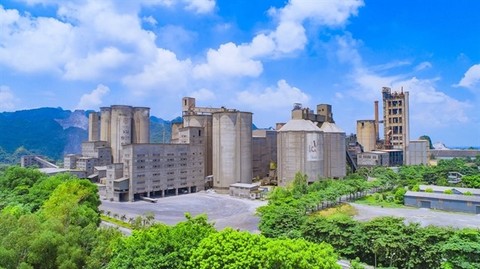
Cement processing plant of Vicem Bút Sơn in Hà Nam Province. — Photo vicembutson.com.vn
Weaker demand and various unfavourable factors are hindering cement companies from rapid improvements, meaning their stocks are unlikely to perform well in late 2024.
In the second quarter (Q2), numerous cement companies saw profits decline, with some even reporting losses. This negative picture has cast a shadow over the majority of cement firms on the stock market.
Among these, Vicem Bút Sơn Cement JSC reported a loss of VNĐ36.5 billion (US$1.5 million) in Q2/2024, marking its seventh consecutive quarterly loss since the Q4/2022.
For the first half of the year, Vicem Bút Sơn accumulated a net loss of VNĐ92 billion, up from VNĐ32 billion in the same period last year. By June 30, the company's total assets had decreased by 3 per cent compared to the beginning of the year to over VNĐ3.4 trillion.
In Q2/2024, Vicem Hoàng Mai JSC posted a net profit of over VNĐ270 million, similar to the previous year. However, the company lost nearly VNĐ40 billion in the first half of the year, with an undistributed loss after tax of almost VNĐ65.3 billion as of the end of Q2.
Meanwhile, Vicem Hà Tiên Cement JSC saw a 5 per cent decrease in revenue to over VNĐ1.9 trillion in Q2. Despite this, it managed a net profit of nearly VNĐ46 billion, down 22 per cent year-on-year.
For the first six months of 2024, Vicem Hà Tiên recorded a revenue drop of 8 per cent to VNĐ3.4 trillion. Although the company made a profit of VNĐ21 billion after Q1 losses, this was an improvement from the previous year's loss of nearly VNĐ27 billion.
The Việt Nam National Cement Association (VNCA) said that cement production for the first six months of this year is expected to hit 44 million tonnes, matching last year's figures. Plants are running at 70-75 per cent capacity, with up to five million tonnes in stock.
Intense competition among cement companies is fuelled by a tough market and various challenges, especially in the north and central regions, where new projects are concentrated and exports are high.
According to experts, amid a struggling real estate market and difficulties in attracting capital, businesses in related sectors, including cement, are feeling the impact.
With the Chinese real estate market stagnant, Chinese cement surplus is set to compete with Vietnamese cement in export markets like the Philippines, Central America and South Africa. This competition is straining the health of cement firms, a trend likely to persist through 2024.

A worker loading cement bags on a truck. — Photo kinhtechungkhoan.vn
Unlikely recovery in short term
In a struggling cement industry, where businesses are facing setbacks compared to last year, Vicem Hà Tiên and Bim Sơn Cement JSC have notably outperformed the market benchmark VN-Index.
Experts attribute their success to optimistic investment expectations, despite concerns about the overall health of these companies.
To navigate industry challenges, Bỉm Sơn Cement and Vicem Hà Tiên are proceeding cautiously in their business strategies. Bỉm Sơn Cement is aiming to reduce losses rather than achieve profits, setting a target of loss after tax of VNĐ159 billion.
Technically, stocks of both Vicem Hà Tiên and Bim Sơn Cement have established market bottoms, attracting cash flows despite their poor performance.
However, the broader cement stock sector may struggle in late 2024.
Forecasts by the VNCA suggest challenges in cement and clinker exports persist due to China's slow real estate market recovery and surplus cement supply.
Domestically, with a consumption of around 60 million tonnes per year against a potential production of 130 million tonnes, the risk of bankruptcy increases without exports.
Conversely, an economic upturn could lead to a cement shortage reminiscent of the pre-2010 period.
Nguyễn Quang Cung, head of the VNCA, said that the cement sector primarily serves infrastructure, real estate and civil construction, with State investments being pivotal for overall development.
Despite strategic government-approved investments, slow project implementation has led to reduced cement consumption.
As a result, the cement industry is poised to endure significant impacts in the upcoming period, negatively affecting cement stocks as a whole.
On the stock market, shares of Bỉm Sơn Cement and Vicem Hà Tiên closed lower on Thursday, down 1.25 per cent and 1.24 per cent, respectively, while Vicem Hoàng Mai and Vicem Bút Sơn stayed flat. — VNS